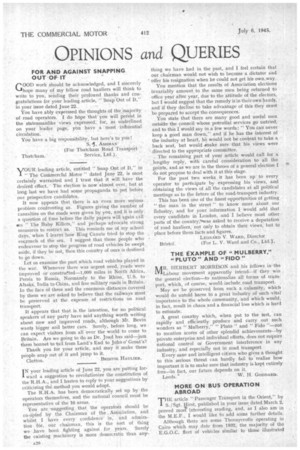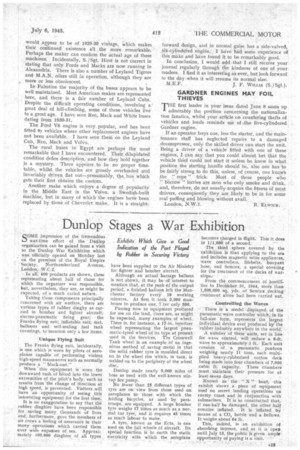OPINIONS and QUERIES
Page 22

Page 25

If you've noticed an error in this article please click here to report it so we can fix it.
FOR AND AGAINST SNAPPING OUT OF IT
GOOD work should be acknowledged, and I sincerely hope many of my fellow road hauliers will think to write to you, sending their profound thanks and congratulations for your leading article, " Snap Out of It
in your issue dated June 22.
You have ably expressed the thoughts dl the, majority of road operators. I do hOpe thatyou will persist in the statesmanlike views expressed; for as underlined on your leader page, you have a most influential circulation.
You have a big responsibility, but here's to you
S. 5, ASHMAN
(For Thatcham Road Transport Thatcham. SerVice, Ltd.).
OUR leading article, entitled "Snap Out of It," in "The Conimercral Motor" dated June 22, is most certainly warranted and. I 'trust that it will have the desired effect. The election is now almost over,. but at . long last we have had some propaganda to put before put prospective candidates. .
It now appears that there is an even more serious problem confronting us. Figures giving the number of casualties on the roads were given by you, and it is only, a question of time before the daily papers will again call ous " The Baby Killers," and perhaps advocate strong measures to restrict us. This reminds me of my school days, when I learnt how King Canute tried to stop the encroach of the sea. I suggest that those people who endeavour to stop the progress of road vehicles be swept aside, if they be not, then this country of ours is destined to go down.
Let us examine the part Which road vehicles played in the war. Whenever there was urgent need, roads were improved or construCted-1,000 miles in North Africa, Persia to Russia, Normandy to the Rhine, U.S. to Alaska:, India to China, and fine military roads in Britain. In the face of these and the enormous distances covered by them we are asked to believe that the railways must be preserved at the expen8e of restrictions on road transport.
It appears that that is the intention, for no political speakers of any party have said anything worth writing about new and improved roads, although Mr. Bevin wants bigger and better cars. Surely, before long, we can expect visitors from all over the world to come to Britain. Are we going to do as Dr. Joad has said—jam them bonnet to tail from Land's End to John o' Groat's?
Thank you for your article, arid may it make these people snap out of it and jump to it. • • Clutton. BRISTOL HAULIER.
I N your leading article of June 22, you are putting forward a suggestion to revolutionize the constitution of the R.H.A., and I hasten to reply to your suggestions by criticizing the method you would adopt.
The R.H.A. has been democratically set up by the operators themselves, and the national council must be representative of the 16 areas.
You are --suggesting that the operatcris should be co-opted by the Chairman of the . Association, and whilst I have every confidence in, and admiration for, our chairman, this is the sort of thing we .have been fighting against for. years. Surely the existing machinery is more democratic than any
' A20. thing we have had in the past, and I feel certain that our chairman would not wish to become a dictator and offer his resignation when he could not get his own.way.
You mention that the results of Association elections invariably amount to the same men being returned to office year after year, due to the attitude of the electors, but I would suggest that the remedy is in their own hands, and if they decline to take advantage of this they must be prepared to accept the consequences.
You state that there are many good and useful men outside the council whose potential services go untried, and to this I would say in a few words: " You can never keep a good man down," and if he has the interest of the industry at heart, 116 would not be content to take a back seat, but would anake sure that his views were directed to the appropriate committee.
The remaining part of your article would call for a lengthy reply, with careful consideration to all the points, and as we are in the throes of a general election I do not propose to deal with it at this stage.
For the past two weeks it has been up to every operator to participate by expressing his views, and obtaining the views of, all the candidates at all political meetings as to the future of the road-transport industry.
This has been one of the finest opportunities of getting " the man in the street" to know more about our industry, and for your information I would add that every candidate in London, and I believe most other . parts of the country,%was asked to receive a deputation of road hauliers, not only to obtain their views, but to place before them facts and figures.
LEONARD V. WARD, Director Bristol. (For L. V. Ward and Co., Ltd.).
THE EXAMPLE OF MULBERRY," PLUTO" AND " FIDO"
MR. HERBERT MORRISON and his fellows in the Labour movement apparently intend—if they win the general election—to nationalize all forms of transport, which, of course, wouldinclude. road transport.
May we be preserved from such a calamity, which would do untold harm to a great industry of such vital importance to the whole community, and which would, in fact, result in chaos and a financial loss which is hard to estimate.
A great country which, when put to the test, can rapidly and efficiently produce and carry out such wonders as "Mulberry," "Pluto " and " Fido "—not to mention scores of other splendid achievements—by private enterprise and individual efforts, does not require national control or Government interference in any industry, and especially not in road transport.
Every sane and intelligent citizen who gives a thought to this serious threat can hardly fail to realize how important it is to make sure that industry is kept entirely free—in fact, our future clepends.on it.
Leeds." W. Jil. GODDARD.
MORE ON BUS OPERATION ABROAD
THE article "Passenger Transport in the Orient," by S./Sgt. Uirst, published in your issue dated March 2, proved most interesting reading, and, as I also am in the M.E.F., I would like fa add some further details.
Although there are some Thornycrofis operating in Cairo which may date from 1932, the majority of the E.G.O.C. fleet of vehicles similar to those illustrated
would appear to be of 1929-30 vintage, which makes their conlinued existence all the more remarkable Perhaps the maker can confirm the actual age of these machines. Incidentally, S./Sgt. Hirst is not correct in stating that only Fords and Macks are now running in -Alexandria. There is also a number of Leyland Tigress and M.A.N. oilers still in operation, although they are more or less obsolescent.
In Palestine the majority of the buses 'appears to be well maintained. Most American makes are represented here, and there is a fair number of Leyland Cubs. Despite the difficult operating conditions,. involving great deal of hill-climbing, some of these vehicles live to a great age. I have seen Reo. Mack and White buses dating from 1936-31.
The Ford V8 engine is very, popular, and has been fitted to vehicles where other replacement engines have not been available. I have seen them on the Leyland Cub, Reo, Mack and Volvo.
The rural buses in Egypt are perhaps the most remarkable that I have encountered. Their dilapidated condition defies description, and how they hold together is a mystery. There appears to be no proper timetable, whilst the vehicles are grossly overloaded and invariably driven flat out—presumably, the, bus which gets their first obtains the custom.
Another make which enjoys a degree of popularity in the Middle East is the Volvo, a Swedish-built machine, but in many of which the engines have been replaced by those of Chevrolet Make. It is a straight
forward design, and in normal guise has a side-valved, six-cylinclered engine. I have had some experience of this make and have found it to be remarkably good.
In conclusion, I would add that I still receive your journal regularly through the kindness of one of your readers. I find it as interesting as ever, but look forward to the day when it will resume its normal size:
M.E.E. J. F. Wietas (S. /Sgt.).
GARDNER ENGINES MAY FOIL THIEVES THE first leader in your issue dated June 8 sums up admirably the position concerning the nationalization fanatics, whilst your article on countering thefts of vehicles and loads reminds me of the five-cylindered Gardner engine.
If an operator buys one, less the starter, and the maintenance staff has neglected repairs to a damaged decompressor, only the skilled driver can start the unit. Being a driver of a vehicle fitted with one of these engines, I can say that you could almost bet that the vehicle thief could not start it unless he knew in what position the starting handle should he, also one has to be fairly strong to do this, unless, of course, one knows the " rope " trick. Most of these people who ." bOrrow " lorries at.e men who only smoke and drink, and, therefore, do not usually acquire the fitness of most drivers, consequently they are likely to be in for some real puffing and blowing without avail.
London, N.W.1. R. ELWICK.




















































